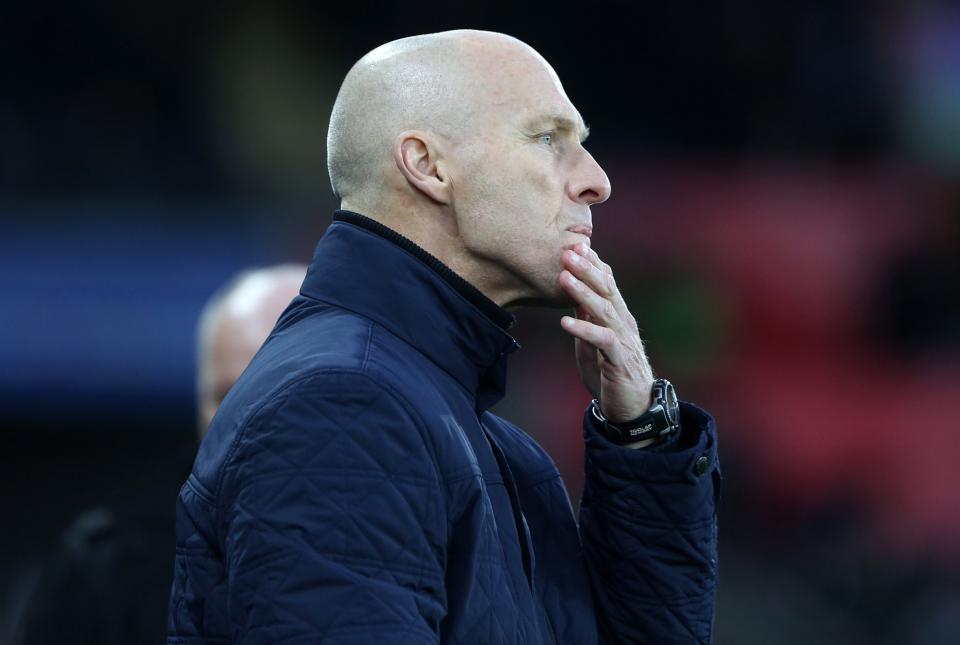Premier League: How Bob Bradley's nationality meant he never stood a chance at Swansea

Maybe it was his lack of Premier League experience. Maybe it was the lack of quality at his disposal. Maybe he was set up to fail at a club without much in the way of direction or strategy. Whatever it was, Bob Bradley lasted just 85 days and 11 games as Swansea City manager. The man who it was hoped would blaze a trail for American coaches might have torched the path for others to follow.
Maybe it was his accent. Perhaps the way he said “soccer” instead of “football” and “PK” instead of “penalty” was what rendered him a failure in South Wales. At least that’s what some would have you believe, including Danny Gabbidon. “I can’t take him seriously,” said the former Wales international not long after Bradley’s appointment. “I don’t know if it’s the American accent.”
Gabbidon’s remarks were rightly shot down by many in the game, but now that Bradley has come and gone as Swansea City manager it’s abundantly clear that nationality and British prejudice against the Americanism of football would always stand in his way. The bar was set higher for Bradley.
Would a British manager have been given more time to at least steady things at Swansea City? In this writer’s judgement, yes. Would the supporter-led witch hunt, which seemingly took its toll on the club’s hierarchy, have been so fierce had the manager in question spoken like a Proper Football Man and not some NFL defensive line coach?
[FOUR NAMES IN THE FRAME FOR THE SWANSEA JOB]
[THE SHORTEST MANAGERIAL REIGNS IN FOOTBALL HISTORY]
That’s not to say there is a prejudice of all Americans in football. Players, to a certain extent, have overcome stereotype to be accepted by the English football elite. But that has only happened through the success of several US players, like Geoff Cameron, Clint Dempsey and Tim Howard. American football needed Bradley to succeed to set a similar precedent for his fellow coaching compatriots. In that sense, his failure at Swansea City is extremely damaging, whether that is fair or not.
Of course, Bradley made mistakes. He made many of them. Swansea got worse under his charge. His team selections were often without rhyme or reason, making too many changes to establish any sort of consistency. He failed to get the best out of the few top tier talents Swansea City have, like Gylfi Sigurdsson or Leroy Fer. Not many players responded to Bradley’s ways and methods. That’s damning of both manager and players.
But Bradley was never given a fair chance, both in perception and in the fact Swansea hired him as manager of the worst squad in the Premier League, sacking him before he had a chance to make any changes in the January transfer window. It is the board and directors at Swansea who should be ashamed of themselves, not Bradley.
Incorrectly, it is widely assumed Bradley was only handed the Swansea City job in the first place because of his star-spangled links with the club’s American owners. Bradley, however, was an appointment made by chairman Huw Jenkins, with his sacking also sanctioned by Jenkins, albeit under pressure from the owners.
That in itself is reflective of the arrogance and ignorance Bradley experienced over the course of his his short time in the Premier League. Despite having managed at international level, collecting over two decades of experience coaching in three different continents and four different countries, the American was deemed substandard. He only got his job because of his his nationality, not the impressive C.V he had built up over an illustrious career. That was the impression.
Before coming to the Premier League Bradley spoke of how English football was the domain of a “network” of managers, managers who do little to justify the jobs that time after time come their way. “There are some very good managers but also some others that aren’t very good but still manage to get jobs and opportunities,” he bemoaned. Alan Pardew, the current favourite to take over at Swansea, is surely the embodiment of Bradley’s prescient protests.
Bradley is a good coach and a captivating character to boot, but he was given scant opportunity to showcase either of those things. The latter offers an especially tragic indictment. It’s a quintessentially British trait to judge a character on how they speak rather than what they are actually saying.
Andy Murray has suffered from this national characteristic for years, with so many judging the Scot to be dull on the basis of his dreary delivery, when in actual fact his comments are among the most compelling in tennis. Ed Miliband lost a general election because he looked foolish eating a bacon sandwich. Bradley was just the latest victim of Britain’s warped valuation of style over substance.
Perhaps the Premier League will one day break from the constraints of its self-imposed convention. Maybe one day an American coach won’t be judged for the way they talk or their different terminology. That day is not today, though.

 Yahoo Sport
Yahoo Sport 







































